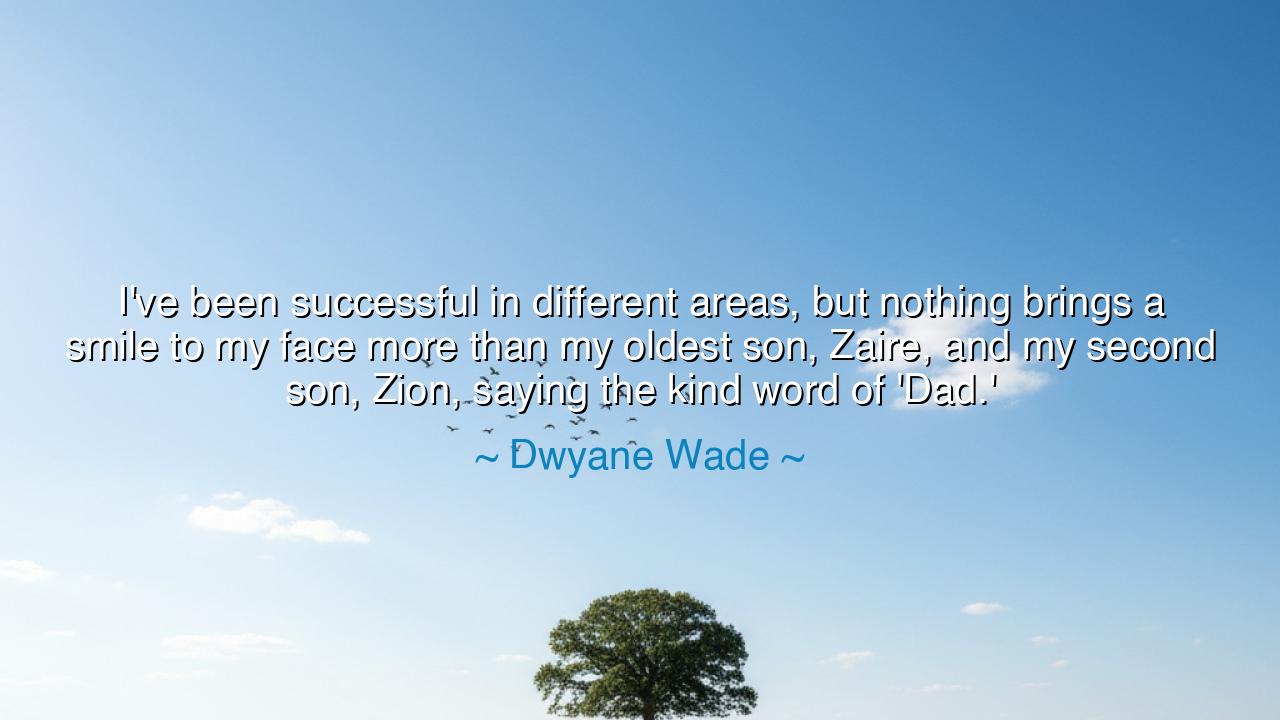
I've been successful in different areas, but nothing brings a
I've been successful in different areas, but nothing brings a smile to my face more than my oldest son, Zaire, and my second son, Zion, saying the kind word of 'Dad.'






Hearken to the words of Dwyane Wade, a man who rose among champions, who tasted the triumph of courts and the roar of multitudes, yet confessed with humility: “I’ve been successful in different areas, but nothing brings a smile to my face more than my oldest son, Zaire, and my second son, Zion, saying the kind word of ‘Dad.’” In this confession lies a truth older than kingdoms, deeper than oceans, and brighter than crowns—that all the treasures of the world pale beside the sacred joy of fatherhood.
For the ancients knew, though they built empires and carved their names into stone, that the mightiest legacy is not in marble nor in gold, but in the lives of children who carry forth the blood, spirit, and love of their sires. The word “Dad”, simple upon the lips of the young, is heavier in meaning than any title of nobility. It is the sound of trust, of shelter, of guidance, of love returned. When Wade declares that nothing surpasses this name, he stands among the wise who learned that glory fades, but family endures.
Think of Marcus Aurelius, emperor and philosopher, who held dominion over the Roman world, yet in his Meditations wrote tenderly of the lessons of his teachers and the influence of his kin. He knew that the empire, vast though it was, would one day slip from his grasp. But the shaping of his son, Commodus, and the values he sought to plant, were of eternal weight. History may remember the empire, but Marcus’s heart was bound to the fragile hope of his family. In this we see again the eternal truth: the sweetness of success is fleeting, but the sweetness of being called father lingers in the soul like incense.
The word “Dad” is not given freely; it is earned in the hidden hours of sacrifice, in the long days of labor, in the silent watch over sleeping children. It is forged in patience, when the child stumbles, and in mercy, when discipline must be tempered with love. To hear it spoken is to receive a crown invisible, a crown greater than laurels, for it binds man not to the acclaim of strangers, but to the hearts of his own flesh and spirit.
Wade’s words shine as a reminder in an age drunk on fame and applause: the court may resound with cheers, but it is the quiet word at home that heals the soul. The victories of the world may fill a man’s hands with trophies, but the laughter of one’s children fills his heart with immortality. When all banners fall, and the crowd turns to another hero, the eternal bond between parent and child remains a fortress that no time, nor enemy, nor fortune can tear asunder.
The lesson, then, is clear: let not the pursuit of wealth, honor, or mastery blind us to the joy of those who call us Mother, Father, Parent, or Guide. The truest legacy we leave is not measured in riches, but in the love that springs forth from the lips of our children. Each person, whether parent or not, can bear witness to this truth by choosing relationship over reputation, love over vanity, presence over possessions.
Therefore, beloved, let each day be marked with deeds that honor family. Be present at the table, where stories are shared and bonds are woven. Guard the hearts of the young with patience and encouragement. Rejoice in the small voices that call your name, for they echo into eternity. And when you stand at the end of your journey, you will find, as Wade found, that the sweetest word ever spoken is not “victor,” not “master,” not “king”—but simply, “Dad.”






AAdministratorAdministrator
Welcome, honored guests. Please leave a comment, we will respond soon